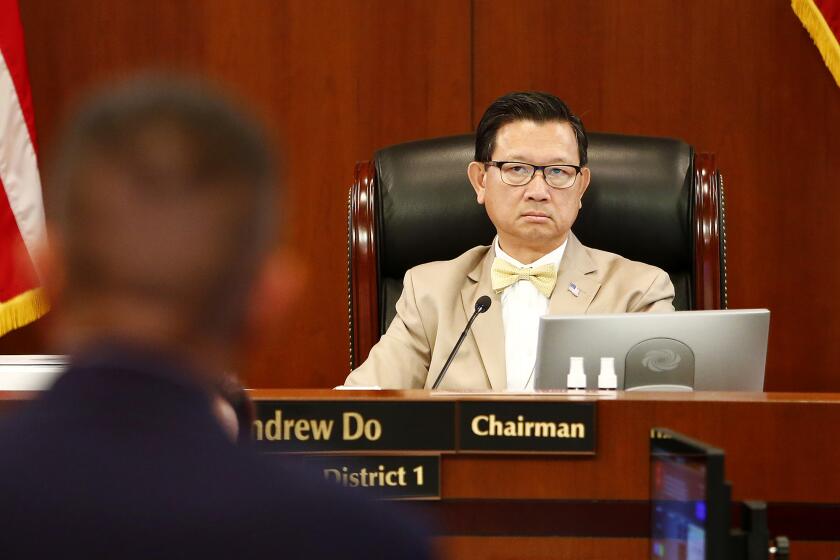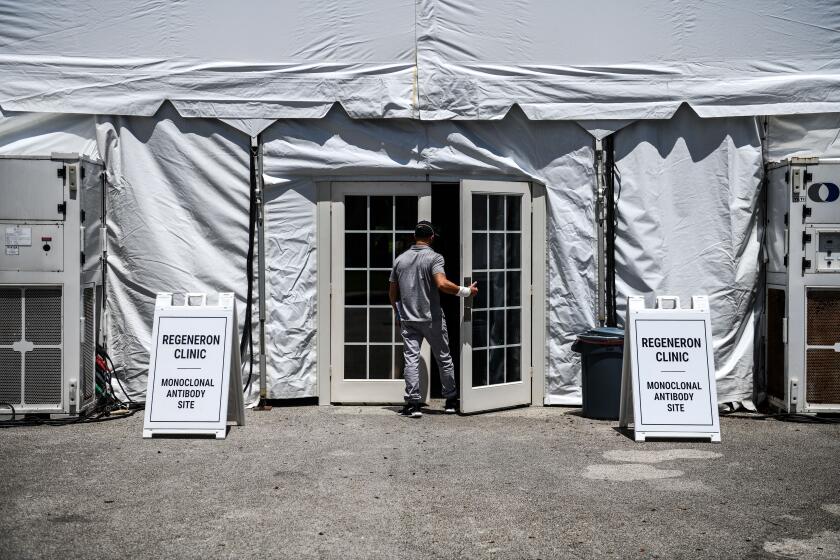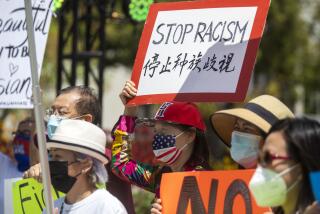Pandemic concerns may prime people to discriminate against Asians and Latinos

- Share via
People who are primed to think about the COVID-19 pandemic are more likely to discriminate against Asian and Latino Americans, a new study suggests.
The findings, described this week in the Proceedings of the National Academy of Sciences, highlight yet another way that the pandemic has ramped up discrimination against racial and ethnic minority groups — one that may be as widespread as it is difficult to detect.
“What it shows is that concerns about COVID in general have the potential to hurt any group that is perceived as ‘immigrant’ or ‘foreigner,’” said Karthick Ramakrishnan, a political scientist at UC Riverside who was not involved in the work. That could help explain “why we’re seeing concerns and reports of hate incidents in surveys [of] Latinos, Asians and other communities of color,” he said.
It’s no secret that anti-Asian violence has risen across the U.S. since the pandemic began. Inflammatory rhetoric by former President Trump that demonized immigrants and blamed China for the pandemic served to vilify a group of Americans based on their ethnic heritage. And in cities around the U.S., reports of violence directed at Asian Americans soared by 164% in the first quarter of 2021 compared with the same period a year prior.
Even in California, where more than 15% of residents have Asian ancestry, reported incidents jumped by 107% in 2020, according to a report from the state attorney general.
The authors of the new study wanted to see if there were less extreme but potentially more commonplace ways in which people might discriminate against Asians — and members of other minority groups — as a result of the pandemic.
“Has the pandemic increased the less visible, everyday forms of social discrimination against Asians?” the researchers wrote. “Additionally, although many consider East Asians the primary victims of COVID-19-related racism, has pandemic-related discrimination affected other racial/ethnic minority groups as well?”
People in Little Saigon are anxious and angry after Board of Supervisors Chairman Andrew Do was called a ‘communist parasite’ and told to ‘go back to Vietnam.’
Questions like these are difficult to answer, because asking people directly whether they engage in discriminatory behavior isn’t likely to yield an honest response. That’s because people who do treat others differently based on their race or ethnicity might be reluctant to acknowledge it, said Neeraj Kaushal, an economist at Columbia University who co-led the study with colleague Yao Lu, a sociologist.
So the researchers took a different tack.
In August of 2020, they sent a survey to 5,000 American adults via YouGov, a public opinion research firm. The majority of respondents were white.
Half of the surveys began with a short paragraph about the state of the pandemic, followed by several questions about how COVID-19 had affected the health, employment and earnings of themselves and their families. This way, COVID-19 would be top of mind when the respondents got to the survey’s third section.
In this final portion, the participants were asked to imagine that they were looking for a roommate in the “Big City” and had placed an online ad to find one. They were then shown a hypothetical email response from a person whose name signaled their race or ethnicity: white, Black, Latino, East Asian or South Asian. (The prospective roommate’s gender always corresponded with that of the survey taker.)
After reading the randomly selected response — all of which were identical, except for the name — participants were asked several questions about the prospective roommate’s financial stability, cultural compatibility, responsibility and courteousness. They were also asked to rate how likely they were to respond to the person and whether they were interested in living with him or her. They responded on a 0-to-10 scale, with 10 representing “extremely” and 0 representing “not at all.”
That’s what the “experimental” version of the study looked like. Meanwhile, the other half of the surveys flipped the reading order and put the questions about a potential roommate at the very top. Only after they were answered did participants read the information about COVID-19 and contemplate its impact on their lives.
The researchers found a striking effect among those who were extremely unlikely to respond to or consider an Asian or Hispanic room-seeker (that is, those who scored their answers as 0, 1 or 2 on that 10-point scale).
For example, 11.4% of those who had been primed to think about COVID-19 before considering a potential roommate indicated a strong unwillingness to respond to Latino room seekers — far higher than the 4.7% of participants in the control group who shared this view.
The pandemic-primed group was also more likely to be very unwilling to respond to East Asian room-seekers (9.7% vs 4.3%), as well as to South Asians (11.1% vs 7.1%).
Now that Comirnaty has full FDA approval, doctors can recommend the COVID-19 shot to anyone for ‘off-label’ use, including children under 12.
The effect held for other questions, too. For example, 14.4% of primed participants indicated they were extremely uninterested in living with a Latino roommate, compared with 6.3% of the control group. The same effect held toward South Asians (15.6% vs 9.9%) and East Asians (14.1% vs 7%).
In all three cases, thinking about the pandemic caused survey-takers to perceive members of these minority groups as “extremely culturally incompatible,” the study authors wrote.
“Additionally, the two Asian groups were more likely to be disparaged as extremely irresponsible and discourteous,” and Latinos and South Asians were more likely to be viewed as financially unstable.
COVID-19-priming, however, didn’t seem to have an effect on prejudice or intent to discriminate against white or Black room-seekers, the authors found. The authors had a possible explanation as to why.
“Whites are perceived as most ‘American,’ followed by Blacks,” they wrote. “These two groups may thus be less vulnerable to pandemic-related discrimination, particularly if it is rooted in xenophobia.”
A study of more than 1,200 COVID survivors who were once hospitalized finds that about half have at least one symptom a year later.
These findings indicate that the pandemic may be heightening a generalized anti-foreigner sentiment — and that people in these groups, no matter their citizenship or how many generations of their family have lived in the U.S., are perceived in some quarters as “perpetual foreigners,” as the study authors put it.
The researchers also examined whether factors such as the participant’s political views and level of contact with members of minority groups before the pandemic — along with the political progressiveness and ethnic diversity of their home county — may have colored their views of their hypothetical potential roommate.
They found that while reminders of COVID-19 increased negative attitudes toward Latinos, prior social contact with them seemed to reduce that negative effect.
The same could not be said of the negative views about Asians, which remained essentially unaffected by the sociopolitical factors that the researchers examined.
Governors in COVID-19 hotspots endorse experimental antibody treatments even as they downplay vaccination and other preventive measures.
Usually, greater contact with minority populations reduces prejudice, said Min Zhou, a sociologist at UCLA who was not involved in the study.
“But for Asians, because of China, it doesn’t matter,” she said, pointing to worsening U.S.-China relations through the pandemic as a reason why. “That imagined enemy or real enemy — it’s very powerful, at this moment.”
Zhou drew an example from not-too-distant U.S. history: the negative attitudes directed toward Americans of Japanese ancestry during World War II. Those sentiments resulted in a policy that sent more than 110,000 people to internment camps.
Reducing anti-minority bias moving forward will ultimately require more research that identifies the many levels — both extreme and everyday — on which this kind of prejudice and discrimination operates.
“If we want to … reduce prejudice, we should get to the root of it,” Zhou said.












